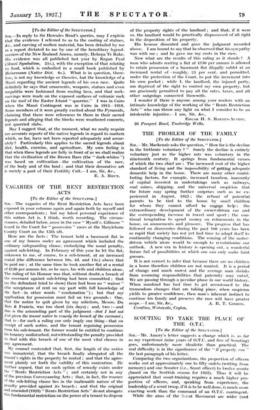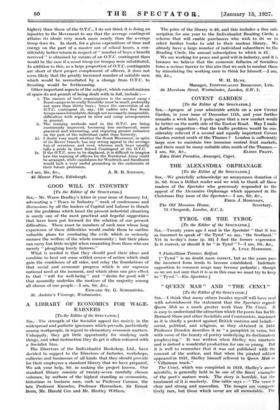SCOUTING TO TAKE THE PLACE OF THE O.T.C.
[To the Editor of the SPECTATOR.] SIR,—Mr. Amory's letter suggests a change which is, as far as my experience (nine years of O.T.C. and five of Scouting) goes, unfortunately more idealistic than practical. The real difficulty is in the significance of the " if properly nut " the last paragraph of his letter.
Comparing the two organizations, the proportion of' officers works out at approximately one to fifty cadets (writing from Memory) and one Scouter (i.e., Scout officer) to twelve scouts (based on the Scottish census for 1925). Thus it will be appreciated that scout-training requires a much higher pro7. portion of officers, and, speaking from experience, the leadership of a scout troop, if it is to be well done, is much more exacting work than the command of an O.T.C. contingent.
While the aims of the .S.:vut Movement are wider (and
higher) than those of the O.T.C., I do not think it is doing an injustice to the Movement to say that the average contingent attains its ideals very much more nearly than the average troop does its. In short, for a given expenditure of time and energy on the part of a master out of school hours, a con- siderably better return in respect of " number of boys x benefit received " is obtained by means of an O.T.C. contingent than would be the case if a-scout troop (or troops) were substituted., In addition to this, as a large proportion of O.T.C. contingents.
are short of their proper complement of officers, it does not seem likely that the greatly increased number of suitable men which would be necessitated by a change -from O.T.C. to Scouting would be forthcoming.
Other important aspects of the subject, which considerations of space do not permit of being dealt with in full, include :—
i. The essence of both organizations is the annual camp Scout camps to be really Scoutlike must be small, preferably. not more than thirty boys ; hence the conversion of an O.T.C. contingent of,- say, 150 cadets into five Scout troops raises formidable, though not necessarily insuperable, difficulties with regard to sites and camp arrangements in general. ii. The training. methods used in the O.T.C. are being enormously improved, becoming less mechanical, more practical and interesting, and requiring greater initiative on the part of the individual cadet than formerly.
iii. I doubt very much whether the Scout Movement, in spite of its Rover branch, has any strong appeal to the average boy of seventeen and over, whereas such boys usually take a pride in their School Contingent of the O.T.C.
iv. If the O.T.C. were to be displaced, it is difficult to imagine how the training of officers for the Territorial Army could be arranged, while candidates for Woolwich and Sandhurst would lack a very useful grounding in the rudiments of their future profession.
—I am, Sir, &c., A. R. B. SIMPSON.
43 Manor Place, Edinburgh.



































 Previous page
Previous page